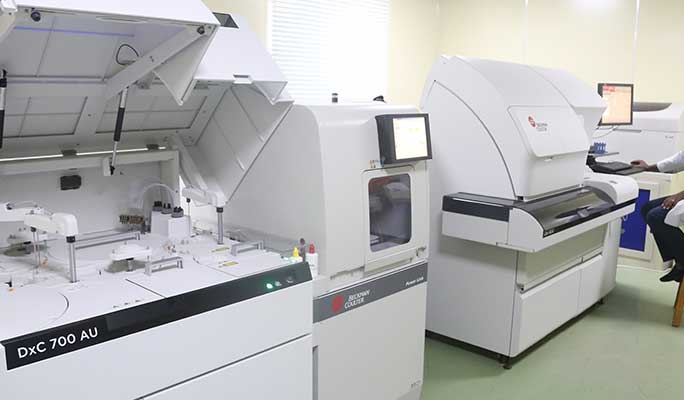
Fortune News | Aug 17,2019
Feb 23 , 2019
By Belay Abera
In Addis Abeba, where there is relatively better healthcare provision, though not cheap, traditional medicine and witch doctors lend themselves to quips.
But in deeply rural areas, where health care like all other basic services is severely lacking, superstitions and medical myths rule. With far fewer medical professionals, most people have nowhere but to turn to the locals who practice the “art of healing” based on practices acquired from religion, culture and experience.
This has given way to a mix of Western biomedicine and indigenous practices in health care. Countries such as Brazil and China have managed to develop traditional medicine in their health care systems. It is as well recognized by the Ministry of Health as an important alternative health resource that is currently readily available to both rural and urban communities. But it is not uncommon for these treatments to drift into medical myths under an environment of lax regulation and awareness.
Medical myths are common in different parts of the world, even the developed ones. The scientifically unsubstantiated belief that vaccines cause mental problems is one of the most popular. There are no witch doctors in this case but they are medical myths that do not have basis in science.
Such views persist even in the United States, where the populace is exposed to information, democratic institutions exist and healthcare is better provided. Underdeveloped nations such as Ethiopia, which lack all these above attributes of the North American nation, fare far worse. It is not only a matter of views, which could be seen as pull factors, but also push factors - mostly lack of access to health care - that is leading to the problem.
Many researchers have documented and published stories about traditional medicine and medical myths at different points in time. Health extension workers, as well as radio and TV advertisements, have helped create awareness about the matter. But the problem persists.
The problem may be exacerbated by the Ministry of Health’s new directives to relax working conditions for health professionals. Making the sector more flexible can have its benefits. Issues related to multiple licensing and extension of the scheme that allows years of medical service to be reduced based on the remoteness of places are in fact commendable.
But the directive also makes it smoother for medical doctors to terminate contracts for service by making the process easier. Worse, health professionals such as nurses, midwives and health officers have been relieved of mandatory medical service.
On the surface, such flexibility can improve the provision of quality service, since health centres now have to attract professionals. But in the short to medium term, it can reduce access to health care, exacerbating an issue that is already worrying.
This will create a gap in health care delivery, leading to loss of human capital, and the medical myths and superstitions that have dominated traditional medicine will fill in the hole. This is a dangerous pathway that needs to be avoided.
Ethiopia is among the highest spenders in health care in Africa, and the efforts in the sector have helped reduce child mortality and diseases like polio and malaria. The government should be commended for its persistent awareness creation programs to contain HIV/AIDS in the 2000s. But using Africa for comparison is setting the bar too low, and global experience shows that the medical industry in Ethiopia is highly lacking.
When faced with an incurable disease, it is easy to understand why citizens of a developing country such as Ethiopia, where there is just one health professional for every 1,000 people, may want to try any treatment. But to find this unquestioning acceptance of dubious remedies for common illnesses is disconcerting.
Unfortunately, doctoral training seldom includes instruction on how to challenge patients deeply held beliefs, with sensitivity, and without being confrontational.
Physicians have a duty to practice rationally, using the best scientific evidence whenever possible. At times, they do not have the evidence to guide treatment. In this situation, unfortunately far too common, they should be humble enough to acknowledge this to the patient and explain the reason why they advocate a particular course of treatment as the best possible one in light of existing knowledge.
But this also entails that there are medical professionals in areas where such beliefs are prevalent. The Health Ministry should thus reinstate mandatory service for necessary professions such as nursing and midwifery since access to medical service is not an issue that should be gambled on at the moment.
PUBLISHED ON
Feb 23,2019 [ VOL
19 , NO
982]


Fortune News | Aug 17,2019

Fortune News | Nov 13,2021

Radar | Oct 24,2020

Radar | Aug 22,2020

Radar | Jan 26,2019

Commentaries | Jun 24,2023

Radar | Oct 17,2020

Covid-19 | Apr 03,2020

View From Arada | Oct 02,2021

Fortune News | Mar 27,2021

My Opinion | 131819 Views | Aug 14,2021

My Opinion | 128203 Views | Aug 21,2021

My Opinion | 126147 Views | Sep 10,2021

My Opinion | 123767 Views | Aug 07,2021

Dec 22 , 2024 . By TIZITA SHEWAFERAW
Charged with transforming colossal state-owned enterprises into modern and competitiv...

Aug 18 , 2024 . By AKSAH ITALO
Although predictable Yonas Zerihun's job in the ride-hailing service is not immune to...

Jul 28 , 2024 . By TIZITA SHEWAFERAW
Unhabitual, perhaps too many, Samuel Gebreyohannes, 38, used to occasionally enjoy a couple of beers at breakfast. However, he recently swit...

Jul 13 , 2024 . By AKSAH ITALO
Investors who rely on tractors, trucks, and field vehicles for commuting, transporting commodities, and f...

Jul 5 , 2025
Six years ago, Ethiopia was the darling of international liberal commentators. A year...

Jun 28 , 2025
Meseret Damtie, the assertive auditor general, has never been shy about naming names...

Jun 21 , 2025
A well-worn adage says, “Budget is not destiny, but it is direction.” Examining t...

Jun 14 , 2025
Yet again, the Horn of Africa is bracing for trouble. A region already frayed by wars...

Jul 6 , 2025 . By BEZAWIT HULUAGER
The federal legislature gave Prime Minister Abiy Ahmed (PhD) what he wanted: a 1.9 tr...

Jul 6 , 2025 . By YITBAREK GETACHEW
In a city rising skyward at breakneck speed, a reckoning has arrived. Authorities in...

Jul 6 , 2025 . By NAHOM AYELE
A landmark directive from the Ministry of Finance signals a paradigm shift in the cou...

Jul 6 , 2025 . By NAHOM AYELE
Awash Bank has announced plans to establish a dedicated investment banking subsidiary...